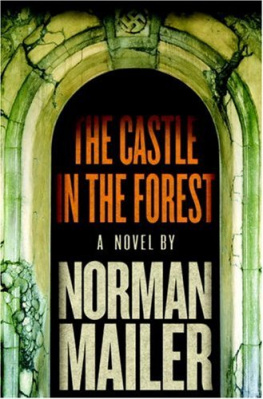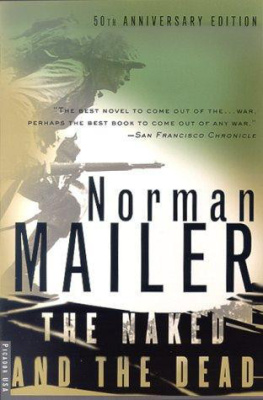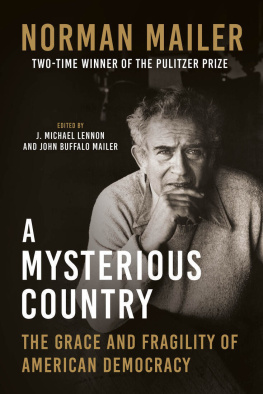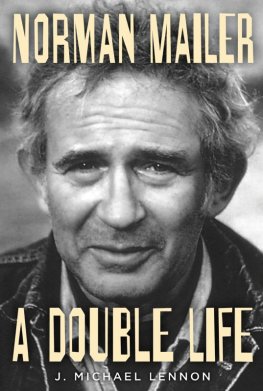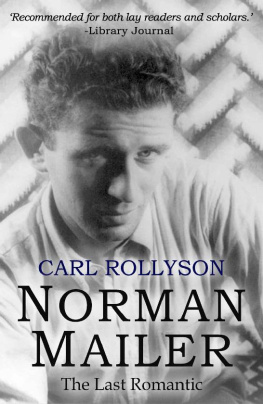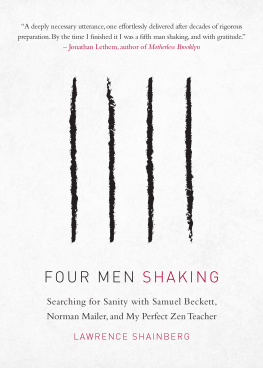Norman Mailer - The Castle in the Forest
Here you can read online Norman Mailer - The Castle in the Forest full text of the book (entire story) in english for free. Download pdf and epub, get meaning, cover and reviews about this ebook. City: New York, year: 2007, publisher: Random House, genre: Non-fiction. Description of the work, (preface) as well as reviews are available. Best literature library LitArk.com created for fans of good reading and offers a wide selection of genres:
Romance novel
Science fiction
Adventure
Detective
Science
History
Home and family
Prose
Art
Politics
Computer
Non-fiction
Religion
Business
Children
Humor
Choose a favorite category and find really read worthwhile books. Enjoy immersion in the world of imagination, feel the emotions of the characters or learn something new for yourself, make an fascinating discovery.
- Book:The Castle in the Forest
- Author:
- Publisher:Random House
- Genre:
- Year:2007
- City:New York
- Rating:4 / 5
- Favourites:Add to favourites
- Your mark:
- 80
- 1
- 2
- 3
- 4
- 5
The Castle in the Forest: summary, description and annotation
We offer to read an annotation, description, summary or preface (depends on what the author of the book "The Castle in the Forest" wrote himself). If you haven't found the necessary information about the book — write in the comments, we will try to find it.
The Castle in the Forest — read online for free the complete book (whole text) full work
Below is the text of the book, divided by pages. System saving the place of the last page read, allows you to conveniently read the book "The Castle in the Forest" online for free, without having to search again every time where you left off. Put a bookmark, and you can go to the page where you finished reading at any time.
Font size:
Interval:
Bookmark:
T H E
CASTLE
I N T H E
FOREST
A NOVEL
NORMAN
MAILER
The Castle in the Forest is a work of fiction closely based on history. A few of
the names and incidents are the products of the authors imagination or are
used fictitiously, and in those cases, any resemblance to actual events,
locales, or persons, living or dead, is entirely coincidental.
Copyright 2007 by Norman Mailer
All rights reserved.
Published in the United States by Random House, an imprint of The Random House Publishing Group, a division of Random House, Inc., New York.
Random House and colophon are registered trademarks of Random House, Inc.
ISBN 978-0-394-53649-1
LIBRARY OF CONGRESS CATALOGING-IN-PUBLICATION DATA
Mailer, Norman.
The castle in the forest: a novel / Norman Mailer.
p. cm.
ISBN 978-0-394-53649-1
1. Hitler, Adolf, 1889-1945FamilyFiction.
2. Hitler familyFiction. I. Title.
PS3525.A4152C37 2007
813.54dc22 2006049389
Printed in the United States of America on acid-free paper
246897531
First Edition
Designed by Stephanie Huntwork
To my grandchildren,
Valentino, Colodro, Alejandro Colodro, Antonia
Colodro, Isabella Moschen, Christina Marie
Nastasi, Callan Mailer, Theodore Mailer,
Natasha Lancaster, Mailer,
Cyrus Force Mailer, and to my grand-niece
Eden River Alson as well as to my godchildren,
Dominique Malaquais, Kittredge Fisher,
Clay Fisher, Sebastian Rosthal,
and Julian Rosthal.
Contents
book i
The Search for Hitlers Grandfather
book ii
Adolfs Father
book iii
Adolfs Mother
book iv
The Intelligence Officer
book v
The Family
book vi
The Farm
book vii
Der Alte and the Bees
book viii
The Coronation of Nicholas II
book ix
Alois Junior
book x
To Honor and To Fear
book xi
The Abbot and the Blacksmith
book xii
Edmund, Alois, and Adolf
book xiii
Alois and Adolf
book xiv
Adolf and Klara
an epilogue
The Castle in the Forest
Acknowledgments
Bibliography
BOOK I
The Search
for
Hitlers
Grandfather
You may call me D.T. That is short for Dieter, a German name, and D.T. will do, now that I am in America, this curious nation. If I draw upon reserves of patience, it is because time passes here without meaning for me, and that is a state to dispose one to rebellion. Can this be why I am writing a book? Among my former associates, we had to swear never to undertake such an action. I was, after all, a member of a matchless Intelligence group. Its classification was SS, Special Section IV-2a, and we were directly under the supervision of Heinrich Himmler. Today, the man is seen as a monster, and I would not look to defend himhe turned out to be one hell of a monster. All the same, Himmler did have an original mind, and one of his theses does take me into my literary intentions, which are, I promise, not routine.
The room that Himmler used... when speaking to our elite group was a small lecture hall with dark walnut paneling and was limited to twenty seats raked upward in four rows of five. My emphasis will not be, however, on such descriptions. I prefer to concern myself with Himmlers unorthodox concepts. They may
even have stimulated me to begin a memoir that is bound to prove unsettling. I know that I will sail into a sea of turbulence, for I must uproot many a conventional belief. A cacophony erupts in my spirit at the thought. As Intelligence officers, we often seek to warp our findings. Mendacity, after all, possesses its own art, but this is a venture that will ask me to forsake such skills.
Enough! Let me present Heinrich Himmler. You, the reader, must be prepared for no easy occasion. This man, whose nickname, behind his back, was Heini, had become by 1938 one of the four truly important leaders in Germany. Yet his most cherished and secret intellectual pursuit was the study of incest. It dominated our highest-level research, and our findings were kept to closed conferences. Incest, Heini would propose, had always been rife among the poor of all lands. Even our German peasantry had been much afflicted, yes, even as late as the nineteenth century. Normally, no one in learned circles cares to speak of the matter, he would remark. After all, there is nothing to be done. Who would bother to call some poor wretch a certified offspring of incest? No, every establishment of every civilized nation looks to sweep such stuff under the rug.
That is, all ranking government officials in the world except for our Heinrich Himmler. He did have the most extraordinary ideas fermenting behind his unhappy spectacles. I must repeat that for a man with a bland and chinless mug, he certainly exhibited a frustrating mixture of brilliance and stupidity. For example, he declared himself to be a pagan. He predicted that there would be a healthy future for humankind once paganism took over the world. Everyones soul would then be enriched with hitherto unacceptable pleasures. None of us could conceive, however, of an orgy where carnality would rise to such a pitch that you might find a woman ready to throw herself into a flesh-melting roll with Heinrich Himmler. No, not even in the most innovative spirit! For you could always see his face as it must once have been at a school dance, that bespectacled disapproving stare of the wallflower, tall, thin, a youth full of physical ineptitude. Already he had a small
potbelly. There he was, ready to wait by the wall while the dance went on.
Yet he grew obsessed over the years with matters others did not dare to mention aloud (which, I must say, is usually the first step to new thought). In fact, he paid close attention to mental retardation. Why? Because Himmler subscribed to the theory that the best human possibilities lie close to the worst. So he was ready to assume that promising children when found in low, nondescript families could be incestuaries. The word in German, as he coined it, was Inzestuarier. He did not like the more common term of such disgrace, Blutschande (blood-scandal), or as it is sometimes employed in polite circles, Dramatik des Blutes (blood-drama).
None of us felt sufficiently qualified to say that his theory could be dismissed. Even in the early years of the SS, Himmler had recognized that one of our prime needs was to develop exceptional research groups. We had a duty to search into ultimates. As Himmler put it, the health of National Socialism depended on nothing less than these letzte Fragen (last questions). We were to explore problems that other nations did not dare to go near. Incest was at the head of the list. The German mind had to reestablish itself again as the leading inspiration to the learned world. In turnso went his unstated couplingmuch recognition might be given to Heinrich Himmler for his profound attack on problems originating in the agricultural milieu. He would emphasize the underlying point: Husbandry could hardly be investigated without comprehending the peasant. Yet to understand this man of the earth was to speak of incest.
Here, I promise you, he would hold up his hand in precisely that little gesture Hitler used to employone prissy flip of the wrist. It was Heinrichs way of saying: Now comes the meat. And with itthe potatoes! Off he would go on a peroration. Yes, he would say, incest! This is one very good reason that old peasants are devout. An acute fear of the sinful is bound to display itself by one of two extremes: Absolute devotion to religious practice. Or nihilism. I can recall from my student days that the Marxist Friedrich Engels
once wrote, When the Catholic Church decided adultery was impossible to prevent, they made divorce impossible to obtain. A brilliant remark even if it comes from the wrong mouth. As much can be said for blood-scandal. That is also impossible to prevent. So, the peasant looks to keep himself devout. He nodded. He nodded again as if two good pumps of his head might be the minimum necessary to convince us that he was speaking from both sides of his heart.
Font size:
Interval:
Bookmark:
Similar books «The Castle in the Forest»
Look at similar books to The Castle in the Forest. We have selected literature similar in name and meaning in the hope of providing readers with more options to find new, interesting, not yet read works.
Discussion, reviews of the book The Castle in the Forest and just readers' own opinions. Leave your comments, write what you think about the work, its meaning or the main characters. Specify what exactly you liked and what you didn't like, and why you think so.

